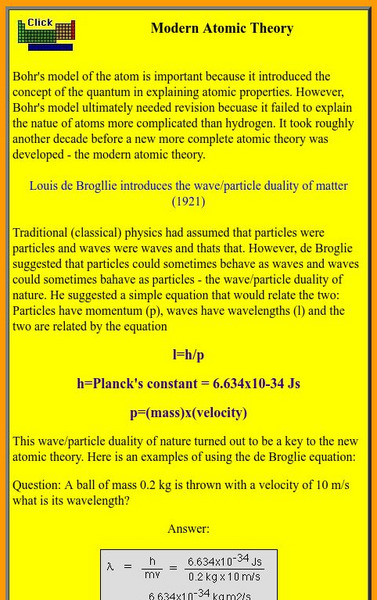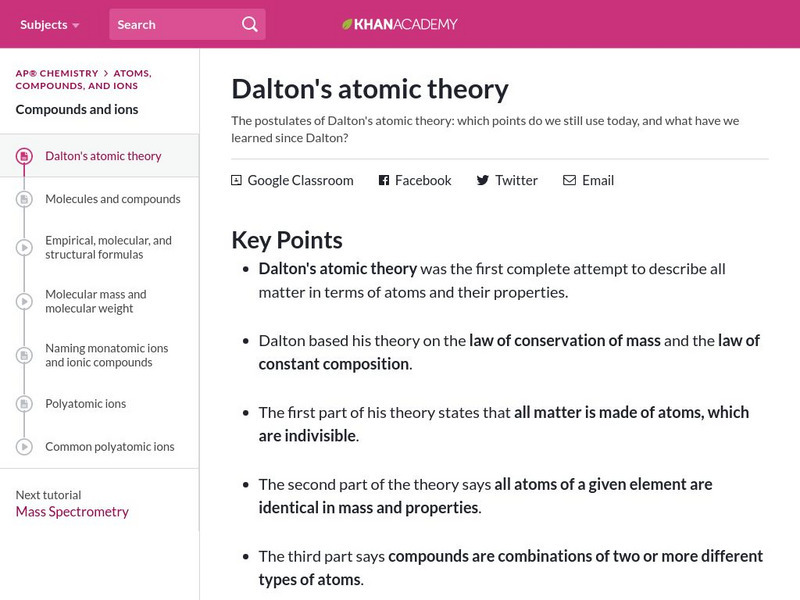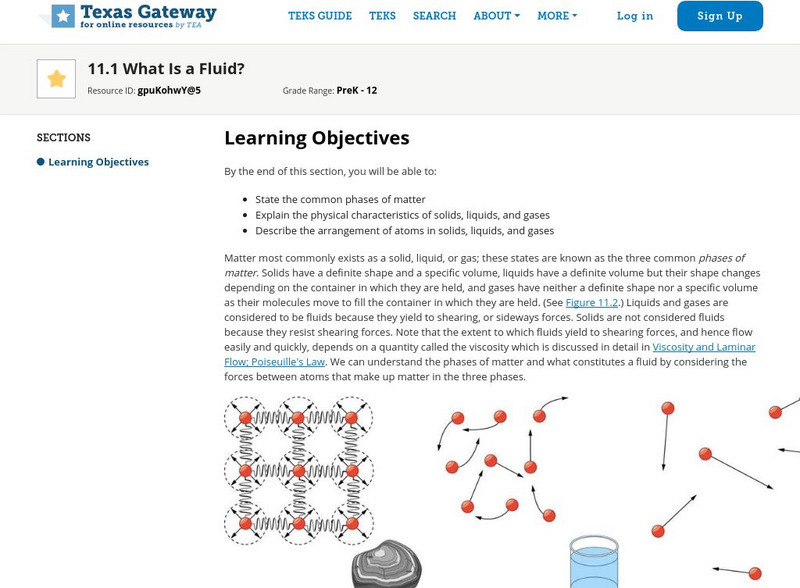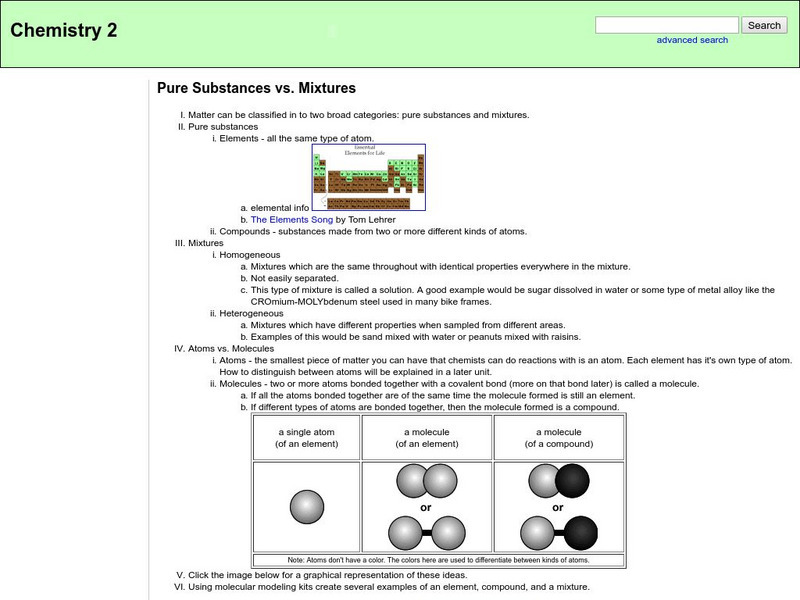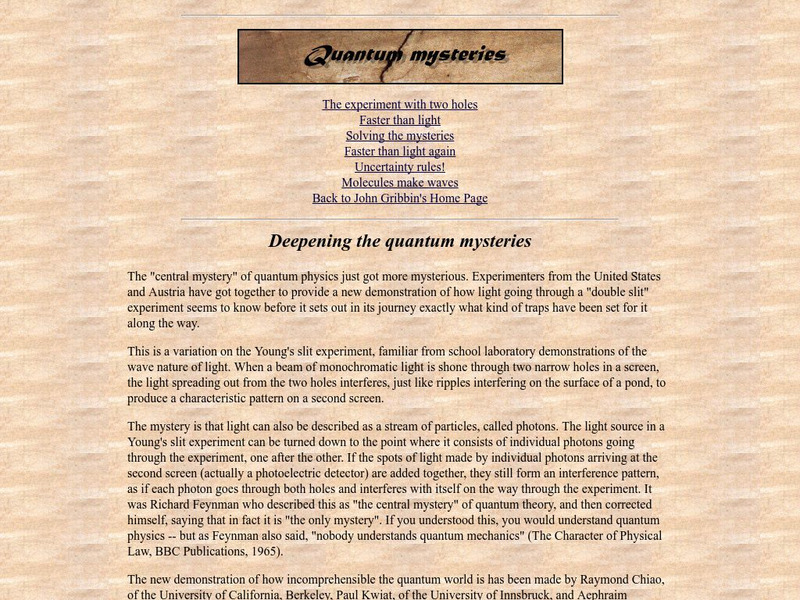Hi, what do you want to do?
Texas Education Agency
Texas Gateway: Introduction to Motion
What do you think of when you hear the word motion? Are you moving right now? You may not think so, but you are. Remember, the Earth is moving around the Sun, and the Sun is moving around the Milky Way Galaxy. Everything in the universe...
Other
Iun: Modern Atomic Theory
This is an excellent site with information on the discovery of the atom and the different models. Includes a sample question and answer using Planck's constant.
South Carolina Educational Television
Know It All: Understanding Electricity | Nasa Online
If you want to understand electricity, you first need to know a little about matter, atoms and electrons.
Science Education Resource Center at Carleton College
Serc: Plastic Polymers: Investigating Their Flexibility
Young scholars will use their prior knowledge about changes of matter to develop a hypothesis to test the physical properties of materials such as plastic (polymers) and how its chemical properties allow it to have unique physical...
TED Talks
Ted: Ted Ed: The Law of Conservation of Mass
Everything in our universe has mass- from the smallest atom to the largest star. But the amount of mass has remained constant throughout existence even during the birth and death of stars, planets and you. How can the universe grow while...
ClassFlow
Class Flow: Comparing and Contrasting Matter
[Free Registration/Login Required] This flipchart is a guided activity to help students compare different types of matter: atoms and molecules, elements and compounds, mixtures and solutions. It corresponds to Virginia science SOL 5.4.
Museum of Science
The Atoms Family
Let this classic family of monsters guide you as you learn about energy. Interactive exercises, experiments, and demonstrations help to build knowledge and raise questions.
PBS
Pbs Learning Media: Atomic Structure
Take a look at the parts of an atom and learn about its properties.
Khan Academy
Khan Academy: Dalton's Atomic Theory
Resource investigates the beliefs of Dalton's atomic theory which consists of four parts. Which points do we still use today, and what have we learned since Dalton?
PBS
Pbs Learning Media: Periodic Table of the Elements Essay
This essay, written for Teachers' Domain, describes the foresight and pattern recognition that Russian chemist Dmitri Mendeleyev used to develop the modern periodic table of elements.
PBS
Pbs Learning Media: Periodic Table of the Elements
This interactive periodic table developed for Teachers' Domain provides detailed information about the chemical properties of elements and illustrates the electron configurations that determine those characteristics.
Texas Education Agency
Texas Gateway: Ap Physics: Fluid Statics: What Is a Fluid?
By the end of this section, you will be able to state the common phases of matter; explain the physical characteristics of solids, liquids, and gases; and describe the arrangement of atoms in solids, liquids, and gases.
American Chemical Society
Middle School Chemistry: Lesson Plans: What Is a Chemical Reaction?
After observing a demonstration of a chemical reaction between a burning candle and the oxygen in the air, students use atom model cut-outs to model the reaction and see that all the atoms in the reactants show up in the products.
CK-12 Foundation
Ck 12: Heat
[Free Registration/Login may be required to access all resource tools.] In this online lesson students will describe how the macroscopic properties of a thermodynamic system such as temperature, specific heat, and pressure are related to...
Annenberg Foundation
Annenberg Learner: Interactives: The Periodic Table
An interactive website where students learn about the basics of an atom, periodic tables organization, and the structure and properties of matter. Module includes an introduction and five lessons that are followed by a quiz and an...
Other
American Institute of Physics: Discovery of the Electron
Use this resource to read about the "Experiments by J.J. Thomson in 1897 [which] led to the discovery of a fundamental building block of matter." This exhibit is organized into several sections, including: "Mysterious Rays" and "1897...
American Chemical Society
Middle School Chemistry: What Is Density?
Calculate the density of cubes made of different materials to determine what type of material it contains. Using this information explain that the size, mass, and arrangement of the atoms or molecules of a substance determines its density.
American Chemical Society
Middle School Chemistry: Periodic Table
Students explore the periodic table and learn the basic information given for elements: the name, symbol, atomic number, and atomic mass for each element.
Chem4kids
Chem4 Kids
Here you can find all kinds of helpful information about chemistry. Learn about reactions, elements, atoms, matter, or biochemistry. Downloads and activities are also included.
University of Colorado
University of Colorado: Ph Et Interactive Simulations: Davisson Germer
Simulate the original experiment that proved that electrons can behave as waves. Watch electrons diffract off a crystal of atoms, interfering with themselves to create peaks and troughs of probability. Java required.
Other
Chemsite: Pure Substances vs. Mixtures
An outline on the topics of pure substances and mixtures.
Mocomi & Anibrain Digital Technologies
Mocomi: Molecules
When two or more atoms combine they give rise to a molecule. A molecule can be made up of many atoms of the same element. There are 112 elements known to man, so can you imagine the different permutations and combinations of molecules...
Other
Quantum Mysteries: Deepening Quantum Mysteries
Although it is arguably the most successful theory in physics, quantum physics has often baffled and confounded both its practitioners and the general public. This informative website discusses the types of mysteries, which still plague...
Concord Consortium
Concorde Consortium: What Are All Materials Made Of?
Activity 4 of this module determines: Which model best supports our observations? This activity reviews the evidence gathered in this investigation and considers how that evidence informs your model of matter. A timeline of the history...






